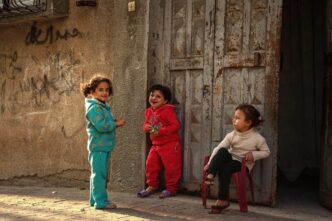British Muslims have long been recognized as one of the most charitable communities in the UK, donating millions annually to mosques, food banks, and international humanitarian causes. Muslim giving, particularly during Ramadan, is a vital part of community life, with an estimated £150 million donated in Zakat (obligatory charity) each Ramadan alone (National Zakat Foundation, 2023). However, soaring inflation, rising energy bills, and ongoing financial uncertainty are reshaping the way British Muslims approach charitable giving.
Many donors who previously gave generously are now struggling to maintain their usual levels of charity. Some have had to cut back on regular donations, while others are prioritizing local causes over international aid. Charities and mosques, traditionally reliant on consistent donations, are also feeling the financial squeeze, with some facing operational challenges due to rising costs.
This shift raises important questions about the future of Muslim philanthropy in the UK. How are attitudes toward giving changing? Are some forms of charity being prioritized over others? And how are mosques and charities adapting to this financial uncertainty while continuing to support those in need?
A Shift in Giving: Fewer Large Donations, More Micro-Charity
A recent report by the Muslim Charities Forum (MCF) found that 40% of British Muslims have reduced their charitable donations over the past two years due to financial pressures (MCF, 2023). The biggest decline has been in voluntary Sadaqah (optional charity), as individuals struggle to balance rising living costs with their desire to give.
Instead of committing to large, structured contributions, many donors are shifting toward micro-charity—making smaller, one-off donations as and when they can afford it. This trend has been particularly evident in grassroots fundraising campaigns, where individuals contribute small amounts collectively. Platforms such as LaunchGood and JustGiving have reported a rise in smaller, frequent donations, reflecting a shift in donor behavior (Charity Digital, 2023).
Although this ensures continued charitable activity, it also means that charities and mosques can no longer rely on steady, predictable income streams as they once did.
Local vs. Global: Changing Priorities in Charity
British Muslims have traditionally prioritized international humanitarian causes, with more than half of all Zakat donations supporting international relief efforts (Islamic Relief UK, 2022). However, the cost of living crisis has led to a significant shift in priorities.
A survey by the National Zakat Foundation found that donations to UK-based food banks and hardship funds increased by 30% in 2023, while contributions to overseas aid organizations slowed down (NZF, 2023). The economic downturn has made poverty in the UK more visible, prompting donors to redirect funds to support struggling families in their own communities.
Charities have also adapted their appeals accordingly. Muslim Hands, which traditionally focused on international relief, has launched more UK-based poverty programs, including winter fuel support and food distribution (Muslim Hands UK, 2023).
Despite this shift, international causes have not been abandoned. Many donors continue to support global humanitarian efforts, but often in smaller amounts or primarily during key fundraising periods like Ramadan.
The Emotional and Ethical Dilemmas of Giving Less
For many British Muslims, charitable giving is not just a financial act but a deeply ingrained religious and ethical obligation. Islam places a strong emphasis on charity, with Zakat being one of the Five Pillars of Islam, and voluntary Sadaqah encouraged as a means of purifying wealth and seeking blessings.
However, the economic downturn has forced many to reevaluate their financial commitments. A study by Islamic Relief UK found that 62% of British Muslims felt “guilty or anxious” about not being able to donate as much as they had in previous years (Islamic Relief UK, 2023). Many worry about balancing their religious duty with their own financial struggles.
Islamic scholars and charity leaders have responded by emphasizing that charity should be given within one’s means. The Quran (2:286) states, “Allah does not burden a soul beyond what it can bear,” reminding believers that their primary duty is to care for their household first. Many are also being encouraged to explore non-financial forms of giving, such as volunteering time or providing direct community support.
Mosques and Charities Facing Financial Strain
The financial strain is not limited to individual donors—mosques and Muslim charities are struggling to keep up with rising costs, particularly energy bills. The Muslim Council of Britain (MCB) reported that mosques across the UK have seen a 50% increase in operational costs due to rising energy prices and inflation (MCB, 2023).
Some mosques have had to cut down on heating during winter or reduce the number of community programs they offer. Others have launched emergency fundraising campaigns just to stay afloat. A growing number of mosques are also being asked for financial assistance from struggling community members, adding further pressure on their resources.
Charities providing food assistance, housing support, and hardship grants have also seen a 25% increase in demand for aid, while donations have declined (Muslim Charities Forum, 2023). Some organizations have had to scale back operations or prioritize emergency relief over long-term projects.
To adapt, many charities are diversifying their fundraising strategies. Crowdfunding campaigns have become more common, allowing organizations to reach a wider audience and collect smaller contributions from a larger number of donors. Some charities are also exploring Islamic finance models, such as investing in community waqf (endowments) to ensure sustainable funding.
Innovative Solutions and Community Resilience
Despite the challenges, the Muslim community in the UK has shown remarkable resilience and adaptability. Several initiatives have emerged to support those in need while maintaining the tradition of giving.
- Digital Fundraising: The rise of online giving platforms has allowed charities to reach a wider audience, with mobile donation apps seeing increased usage.
- Community Networks: Local mutual aid groups, including WhatsApp community funds, have facilitated direct support among families in need, reducing reliance on formal charities.
- Financial Literacy Programs: Some mosques and charities are now offering financial education sessions to help families better manage their budgets while maintaining their charitable commitments.
There is also a growing movement toward sustainable giving models, such as investment-based charity funds that generate long-term income for humanitarian efforts. These approaches are helping to ensure that, even in difficult times, the spirit of giving remains alive.
The Future of Muslim Philanthropy in the UK
Looking ahead, Muslim charitable giving in the UK is likely to continue evolving in response to economic realities. While the traditional patterns of large donations may decline, alternative methods of supporting charitable causes will continue to develop.
- A continued focus on local giving as poverty within the UK becomes more visible.
- Greater emphasis on micro-charity, where small but consistent donations replace large lump sums.
- More collaboration between charities and mosques to create sustainable support networks for struggling communities.
- A rise in alternative funding models, including digital Zakat platforms, investment-based endowments, and community-driven financial aid initiatives.
Despite the financial strain, British Muslims remain among the most generous communities in the UK. The current crisis is forcing a transformation in how and where donations are directed, but the commitment to charity remains unwavering.
A Test of Generosity and Adaptation
The cost of living crisis in the UK has had a profound impact on Muslim charitable giving, reshaping priorities, donation habits, and fundraising strategies. While economic pressures have led to reduced contributions in some areas, the spirit of generosity remains deeply rooted.
Mosques, charities, and grassroots organizations are adapting to the new financial reality, ensuring that those in need continue to receive support. The future of Muslim philanthropy in the UK may look different, but its essence—a commitment to helping others—remains unchanged.
Sources
- Muslim Charities Forum (2023). The State of Muslim Giving in the UK.
- National Zakat Foundation (2023). Zakat and Sadaqah Trends in a Cost-of-Living Crisis.
- Islamic Relief UK (2023). Charitable Giving in Times of Hardship.
- Muslim Council of Britain (2023). Mosque Financial Sustainability Report.
- Charity Digital (2023). How Online Donations Are Changing Philanthropy in the UK.














